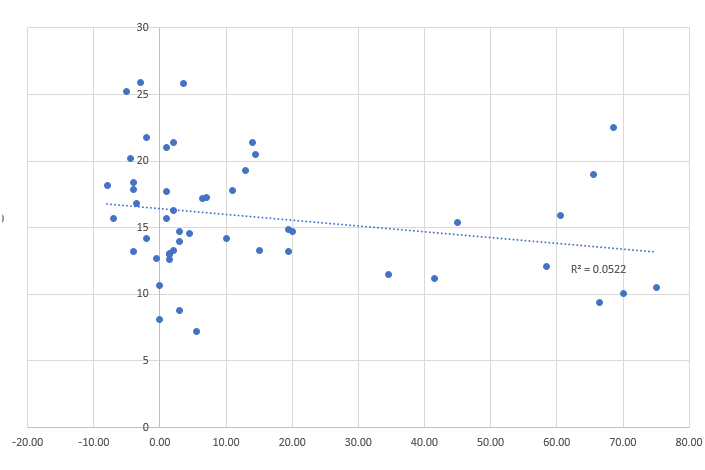Shane Killian showed in an online video an evaluation of a correlation of gun laws to gun homicide rates, using the Brady Campaign’s scoring of gun laws. He found there is virtually no correlation between gun laws and gun homicides:
But from what I’ve seen, he didn’t do a similar evaluation on gun laws and suicide. I’m here to fill in that gap. And if he actually did do one, this is merely a check on his work.
I used the numerical score determined by the Brady Campaign in their 2013 State Scorecard (since removed, but archived by the Wayback Machine). I used the raw total and not the curved total to avoid any skewing or bias. Suicide rates are for 2016 as determined by the National Center for Health Statistics. Feel free to double-check my results.
The hypothesis being tested is quite simple: stronger gun laws correlate with lower suicide rates. Gun control proponents argue that stronger gun laws, thereby making it more difficult to obtain a firearm, will mean a reduction in suicide rates. Basically rejecting the idea that someone who is suicidal will seek out another method if their first method of choice is a firearm and they cannot get one.
So using Brady’s scoring of State gun laws against suicide rates, how do the numbers stack up?

The scatter plot places the Brady score along the X-axis, suicide rate along the Y-axis. Looking at the concentration of plots close to the 0 line, there are a lot of States with what the Brady Campaign considers to be “weak” gun laws with suicide rates across the spectrum.
So the plot alone shows no noticeable correlation. And the R² regression value confirms this: -0.0522 (Excel for some reason is not showing the correlation is actually negative). That’s very, very weak. I re-ran the regression as well with suicide rates for 2014, since the suicide rates were lower and it’s the year immediately following Brady’s scoring, and the correlation was also very, very weak: -0.0328.
For those not familiar, a correlation with an absolute value of 1 is a perfect correlation. Anything over 0.7 is considered a strong correlation, while anything under 0.3 is generally considered a weak correlation. Meaning a correlation of less than 0.1 is considered very weak.
To even begin to imply causation, you need a strong correlation. Meaning this correlation cannot even be used to imply that stronger gun laws mean lower suicide rates, yet that is the ready assertion.
Stronger gun laws, as scored by the Brady Campaign, do not mean fewer suicides. The correlation heavily implies what many have said about using gun control to lower suicide rates: those who want to die will find another way.
Stricter gun laws may reduce the rate of suicide by firearm, but they do not, in general, reduce the overall incidence of suicide.
You must be logged in to post a comment.